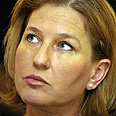


More people will arrive at the Yarkon Park to see Paul McCartney perform than the number of people who bothered to show up at poling stations in order to elect the person who may become Israel’s next prime minister.
This is the bothersome fact that emerged from the Kadima primaries, which ended up culminating in a tight race. A total of 0.5% percent of the public – this is the mandate received by a leader during one of the most fateful and complex periods in the State of Israel’s history.
And still, a new Kadima chairwoman was elected Wednesday, thereby averting a political earthquake and possibly also a ruling party split. Kadima has become the first party in many years to elect a woman as its premiership candidate, and in the process chose a civilian without defense experience over a general who delivered results in the past.
But make no mistake about it: This victory does not guarantee that Livni will become prime minister. She now faces a difficult period. Following the justified euphoria, Livni will have to decide between two intricate alternatives: Whether to take advantage of the momentum and ride the wave of success to general elections, or else, exploit the priceless opportunity she now has to form an alternative government.
It may be that in order to maintain her clean image, it would be appropriate for Livni to go to elections in order to allow the entire public to elect its prime minister, thereby upgrading her legitimacy. Yet it would be difficult to blame her should she decide not to gamble on her primaries achievement and go to elections that may end badly for her.
It is customary to say that Shas is the obstacle faced by Livni en route to an alternative government, yet this is inaccurate. First of all, Livni would be able to form a government even without Shas, by bringing Meretz into the coalition and relying on the Arab parties. Moreover, there is no certainty that Shas, once it realizes that such government is realistic, would give up the opportunity to join it. Livni’s problem is not Shas, but rather, the Labor party.
What will Barak do?
The voices emerging from Ehud Barak’s direction recently were talking about an emergency government, or else, elections. The big question that remains is what will Barak be doing? Will he announce his decision to go to elections, or will his well-founded fear of elections overcome other considerations at this time? In any case, it would be interesting to see the next moves of the man who demanded that Olmert be replaced and pushed Kadima to hold the primaries.
For a long time, Livni conveyed the sense that she is interested in new elections, and that should she win Kadima’s leadership race, she would go to elections and defeat Netanyahu. Yet in recent weeks she has been talking about an alternative government and her ability to form such government. It appeared that she changed her position because she realized that Kadima’s registered voters do not want elections.
A senior Kadima figure said Wednesday that Livni would find it easier to go to elections than to take difficult coalition-related decisions, such as Barak’s demand to fire Justice Minister Friedmann, or Eli Yishai’s demand to boost child allowances. In order to form a government, said the senior source, one needs to make difficult decisions. Livni would prefer to present tough positions in coalition talks, not surrender to exaggerated demands, maintain her clean image, and go to elections that way, rather than erode her public status for the sake of a few months in a power.
The decision on the next move is in Livni’s hands. She already proved that she is able to win – but how about taking decisions? We’ll wait and see.















